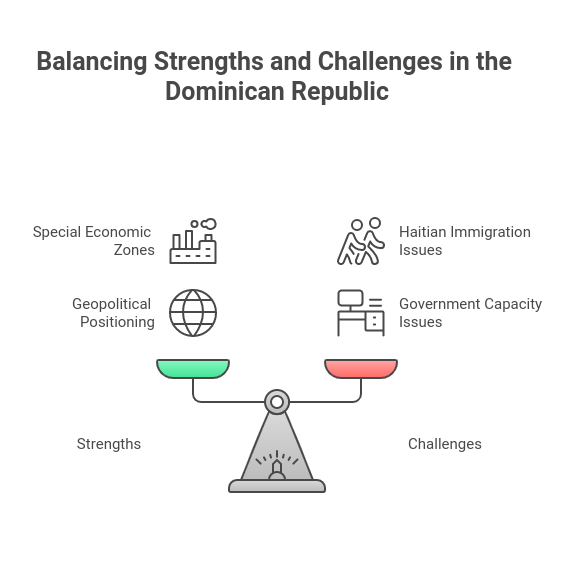Executive Summary
The Dominican Republic presents an attractive investment environment. A persistent desire for foreign investment has intensified with the recent re-election of President Luis Abinader, drawing international businesses to the country. Even so, broad tension toward Haitians living in and coming to the country, combined with longstanding government capacity issues are the two principal challenges threatening a continued stable operating environment. Further analysis of the Dominican Republic reveals the Government’s current policy paths, its incentives for them, and the broader outlook of the country for organizations.

Strengths
• Special Economic Zones driving investment:**
The Zona Franca, or Free Zone, is an integral part of the Dominican Republic’s economic strategy, offering nearly complete tax breaks for operations and streamlined rules to facilitate start-up, giving companies an easier tax and operation system that somewhat shields them from normal government intricacy and inefficiency. Operation in these zones is crucial to the success of foreign businesses. The Abinader administration continues to push for investment by announcing expansions of existing zones, and the creation of a new one. Thus, expanding these Zones will be a government priority for the foreseeable future.
• Geopolitical Positioning:
Strategically located in the Caribbean, the Dominican Republic is increasingly perceived as a nearshoring platform and a close partner of the United States, both politically and economically, under the CAFTA-DR free trade agreement. The deterioration of the existing trade structure from the Trump administration’s imposition of a 10 percent tariff has been an open question. Yet, economic pressures have not altered President Abinader’s desire for close relations with the U.S., and the Dominican Republic’s geopolitical positioning remains strong. Additionally, economic ties with China have expanded over the last decade, which is a promising sign that the Dominican Republic will continue to achieve high economic development.
Challenges
• Haitian Immigration and the Severe Government Response:
Coming off his campaign promises in response to increased immigration of Haitians, the Dominican Government has implemented mass deportations, police crackdowns, and amplified the militarization of the border between the two countries. This escalation is emblematic of how Haitians in the DR suffer from systemic discrimination, where thousands are effectively stateless due to Dominican Government’s overturn of birthright citizenship over 10 years ago. Public support for tighter immigration control provides an important driver for these policies. Haiti’s dire situation forces even more people to flee the country, feeding into anti-immigration sentiment in the DR. Harsh responses by Abinader only serve to exacerbate existing racial tensions. While only scattered protests against Haitians have been reported, the situation is volatile.
• Weak government institutions undermine effectiveness:
The current administration’s programs have been primarily focused on a series of anti-corruption measures, cybersecurity investments, and bureaucratic reforms to revitalize governance in what they call the 2030 Digital Agenda. The announcements are encouraging on the surface. However, there are reports that the Abinader only targets opposition figures, leading to calls that the President uses anti-corruption measures for his own benefit. This is particularly concerning after Abinader’s party gained more power after re-election. However, it should be noted that Abinader has legally barred presidents from extending their terms of office, which is a positive sign amidst the criticism. Meanwhile, cybersecurity efforts are welcomed by all, but development is new. These reforms are years-long projects, even with sincere efforts to improve, which is why they remain a challenge for the Country.
1-Year Outlook
Baseline Assumption
Despite the social and governmental risks presented, the Dominican Republic Free Zone system is very likely to persist and the country will maintain its friendly investment climate. Organizations should expect government capacity to meaningfully increase from the reforms, albeit incrementally. Primarily owing to the fact that the Abinader government has considerable economic incentives to maintain its geopolitical positioning. Thus, the trajectory of the DR’s investment profile is likely to increase. However, societal and government tension with Haitians is the most important watchpoint for instability, even though chances of wider protests affecting business operations appear low.
Alternative Outlook
The escalation of discriminatory actions toward Haitians by the Dominican government is a concerning trend and, most importantly, likely to continue. Public support for these policies is growing, and there is a chance that larger anti-Haitian protests occur, or protests against the government actions materialize and provide moderate destabilization.
Additionally, there is a lesser, but feasible, likelihood that the government reforms initiated by Abinader do not lead to meaningful improvements. What is most important is that the President is in a powerful position to utilize anti-corruption programs and the judicial system to consolidate power. Some of the political opposition already believes this, and further centralization of power should draw scrutiny. At the moment, this risk should be monitored, but the next national elections will provide a better idea as to the validity of these claims.
